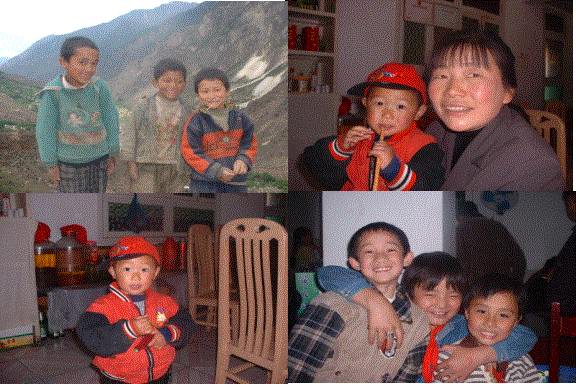China Cycling Travelogues
Do you have a China cycling travelogue you would like
to share here?
Contact us for details.

Danielle R. Reed
Cycling in Western Sichuan
Copyright © Danielle R. Reed, 2002.
Part 1
[Editor's note: This travelogue was written by Danielle R. Reed, PhD. about the Western Sichuan Bike Tour to Danba trip she took with Bike China.]
Bicycling in China.
In April of 2002, I flew from my hometown of Philadelphia to Shanghai to attend the Human Genome Organization International Meeting, where I stayed at the Oriental Riverside Hotel, near the Oriental Pearl Tower. After the meeting was over, I took a three-hour airplane ride to the city of Chengdu, which served as a base for the bicycle trip. The bike ride started near sea level in the Sichuan Basin and we climbed steadily up over a mountain pass, to Rilong town, near the Four Sisters Mountain, and onward, along a river gorge, to a town called Danba. To return to Chengdu, we retraced our route by public bus, and arrived on the outskirts of Chengdu, where were met by pre-arrangement and driven back to Chengdu. The bike trip took eight days, and the details and highlights are below. Peter Snow Cao, who developed this tour, has an account with details about route and elevations, which you may want to consult.
Choking in Chengdu.
You may have heard of the Chinese city of Chengdu but I hadn’t. Although Chengdu is a very large city, probably rivaling my hometown of Philadelphia in population, it was unknown to me. I went there because I wanted to tour China by bike, bypassing tourist spots, and see its daily life. The only English speaking bike tour company that I could find, BikeChina, was located in Chengdu and so I flew to Chengdu from Shanghai.
In America in the 1970’s, there were a rash of made-for-TV movies designed to whip up support for clean-air legislation. A typical closing scene in these movies was of a body of a dead bird, unable to survive in the dirty air humans had created. The scenes in these movies came to mind as I got off the airplane in Chengdu in the People’s Republic of China. The air was dark gray, and I panicked, wondering if it was safe to breathe. In the airport, people seemed to be going about their business, so I had to assume that the air was not immediately fatal. I got off the airplane and breathed, and the air smelled normal, so I met my guide and collected my luggage, went outside and got a taxi, surreptitiously looking around for dead birds.
Mee Huang was my guide, a Malaysian-born Chinese woman, who, coincidentally, was educated in England at the same University (Leeds) that my husband attended. She speaks both Mandarin and English fluently. In Chengdu, we stayed at Sam’s Guesthouse on a side street. During my five days in Shanghai, I had stayed in a five-star hotel catering to Western business people, with everything business travelers might want but without any features that might indicate that you were in any particular country, especially China. Sam’s Guesthouse was clearly in China, and our adventure was beginning.
Would you rather have people beg for money, or overcharge you? Although I biked through rural parts of China where people were poor, no one, during the entire trip, ever begged me for money. The only time I saw anyone that looked like they would take money from a stranger was a disheveled man who sat outside a monastery in Chengdu, and he sat quietly, in a daze, with a bowl for alms. However, just because there was no begging does not mean that we didn’t supplement the pockets of those we encountered along the way. Overcharging of foreigners is a common and legal practice, and the Chinese have no shame about trying to extract what money that they can from you. However, if you give them extra money without being asked, for instance, tipping a taxi driver, there is bewilderment and suspicion. Why would you pay more than the asking price? Tipping demonstrates that you have not understood the game in China.
What can a middle-class American learn about China in a week?
I speak no Mandarin other than to greet people and to say good-bye, and I only recognize the Chinese characters for male and female to choose the correct restroom in public facilities. To learn and understand about China, I relied on what I saw, not what people told me, and although sometimes frustrating, I was comforted by the American idiom "actions speak louder than words". So there is a lot that remains a mystery, but I can tell you what I saw and how I interpreted what I saw.
Chinese children are the stars of the show.
Because I was homesick for my son and daughter, children caught my eye first in most situations. I saw many children of all ages in the city, town and country, but I never saw an adult speak a harsh word to a child and I never heard a baby cry. Babies are carried around by adults, never left alone, and never put down on the floor. The babies were plump, clean and were usually the best-dressed members of the family. Whether this apparent love of babies is a by-product of the government policy that restricts each family to one child, or reflects a long-standing, natural love of children, I don’t know. I took several pictures of children I encountered along the way—I was shy about taking the pictures of adults because I didn’t have sufficient Mandarin to ask their permission, but everyone was always enthusiastic when I took pictures of children.

One of my favorite parts of the trip, the children of China.
My white and foreign face was startling to babies, and they would often cry when I tried to play with them, which made me sad.
Older children were curious about me, and friendly—they would often rush up and try out their English. Common phrases were "hello, bye-bye, and how-are-you?" By U.S. standards, I am a well-educated person, having a Ph.D. and so forth, but I am ashamed to tell you that the average Chinese nine year-old child speaks more English than I can speak Mandarin. My impression was that speaking English is "cool" in China, an opportunity to impress your peers and is not perceived to be giving in to the Ugly American. Chinese people were proud to speak English in the same way that English speakers are proud to order French food in French restaurants speaking fluent French. It impresses friends. Teen-age children would often greet me in English, and when I replied in English, they burst into embarrassed giggles. Several of the teenagers strived unsuccessfully to convince their friends that they spoke English with foreigners all the time. No one, however, was fooled by this display of moxie.
Danielle R. Reed - Cycling in Western Sichuan: Part 1 | Part 2 | Part 3 | Part 4
Bike China Adventures, Inc.
Home | Guided Bike Tours | Testimonials |
| Photos | Bicycle Travelogues
| Products | Info |
Contact Us
Copyright © Bike China Adventures, Inc., 1998-2012. All rights reserved.
